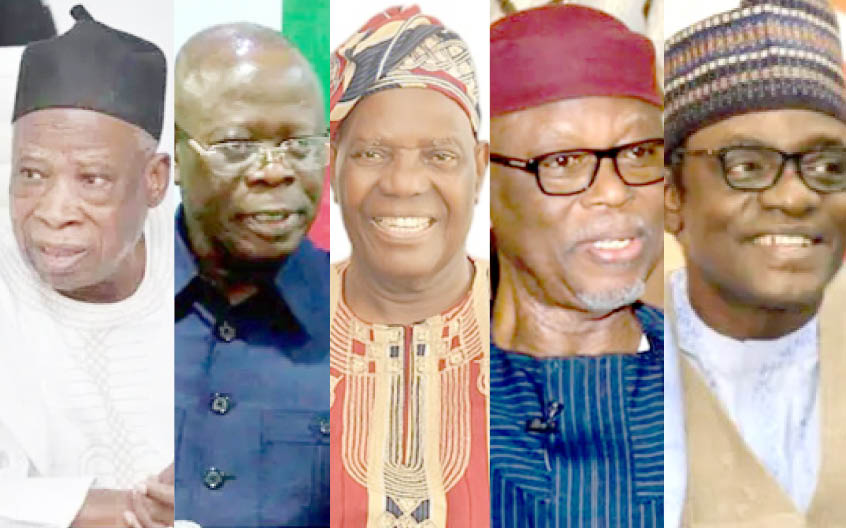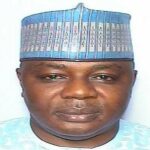The dramatic exit of the ruling All Progressives Congress (APC) national chairman, Senator Abdullahi Adamu last Sunday, has reminded Nigerians of how political parties in Nigeria, especially the ‘big ones’ lack internal democracy.
Adamu’s resignation came to some people as a surprise, but to others, it was only a fulfillment of the political parties’ known tradition of sacking national chairmen or forcing them to resign before the end of their tenure.
From 2013 when the APC was formed till date, it has had five national chairmen, with the majority of them exiting their position in crisis-ridden and controversial circumstances.
The five APC national chairmen since 2013 are Chief Bisi Akande (2013 – 2014); Chief John Oyegun (2014 – 2018); Comrade Adams Oshiomhole (2018 – 2020); Mai Mala Buni (2020-22) and Senator Abdullahi Adamu (2022 – 2023).
- Plateau denies deaths of 1,000 cows to strange disease
- Tinubu’s house cleaning exercise: Who’s next?
The APC came to the political scene to dislodge the Peoples Democratic Party (PDP) and administer a progressive government and it succeeded in taking over power in 2015. But since then, most of the times when it is in the news, it is either about leadership crisis in the state chapters or the national secretariat.
The political parties that collapsed their structures to form the APC were the Action Congress of Nigeria (ACN), Congress for Progressive Change (CPC), All Nigeria Peoples Party (ANPP), a breakaway faction of the All Progressives Grand Alliance (APGA) and the new Peoples Democratic Party (nPDP).
Abdullahi Adamu
Senator Adamu emerged as the APC national chairman at the party’s national convention in March 2022 at the Eagles Square, Abuja.
His emergence triggered discontent and acrimony within the party as other contenders for the slot were compelled to step down for him.
Adamu was the then President Muhammadu Buhari’s preferred candidate among other heavyweight politicians, including former governors who locked horns to clinch the office.
The president said those who stepped down should be refunded the money they spent on expression of interest and nomination forms, an issue that is still in contention.
Shortly after his emergence, the former governor started receiving heavy bashing from party members, including staff at the party’s national secretariat in Abuja over his alleged poor leadership style.
He was accused of owing salaries of APC staff for months and not abiding by the tradition of providing Sallah, New Year and Christmas packages like his predecessors.
He was also accused of singlehandedly sacking some directors at the party’s national headquarters and bringing in his allies to fill in the slots, an allegation he debunked during one of his press conferences.
Recently, Adamu had the party’s national vice chairman (North West), Salihu Mohammed Lukman to contend with as he was consistently accused of running the party like his “private business.”
Adamu has been accused of not convening meetings of key organs of the party, including the National Executive Committee (NEC), which is the second highest decision-making organ of the party, after the national convention.
Lukman had specifically accused Adamu of not rendering financial account of incomes and expenditure of the party from inception to his last days in office.
He alleged that Adamu had failed to give an account of the over N30billion raked in from the sale of expression of interest and nomination forms prior to the 2023 general elections.
Consequently, Adamu had fixed July 10 and 11 for National Caucus and NEC meetings to iron out critical issues affecting the party and the crisis within the National Working Committee (NWC).
This was also as some party chieftains, including some NWC members, alleged that Adamu didn’t work for President Tinubu’s victory.
However, the National Caucus and NEC meetings were later postponed and rescheduled for last Tuesday and Wednesday.
But in a dramatic twist, Adamu resigned in a letter addressed to President Bola Tinubu on Sunday. The party’s national secretary, Senator Iyiola Omisore, also resigned.
Following Adamu’s resignation, the deputy national chairman (North), Senator Abubakar Kyari, assumed the office in acting capacity pending the election of a substantive national chairman at a mini national convention to be held within three months.
Addressing newsmen at the end of APC governors meeting on Wednesday night, the Imo State governor and chairman of the Progressive Governors Forum (PGF), Hope Uzodinma, said the governors welcomed Adamu and Omisore’s decisions.
Some critical stakeholders of the party confirmed to Daily Trust on Sunday that a former governor of Kano State, Abdullahi Umar Ganduje, has been tipped to replace Adamu at the next convention. However, the date for the convention is yet to be fixed.
Adams Oshiomhole
Oshiomhole, a former governor of Edo State, became the APC national chairman in June, 2018.
Like Adamu, Oshiomhole, a former chairman of the Nigeria Labour Congress (NLC), was anointed by former President Buhari and other stakeholders of the party.
But his tenure was characterised by intense crisis, which led to his sack and other members of the National Working Committee (NWC) under his watch.
The National Executive Committee (NEC), which is the second highest decision-making organ of the party, sacked the Oshiomhole-led NWC on June 25, 2020, over an alleged abuse of office and failure to unite the various interests in the party.
Oshiomhole and his team had just spent two of their four-year term when an existential crisis hit the party over the control of its structure.
A series of litigation, which led to Oshiomhole’s suspension via a court order followed and several members of the NWC began to lay claim to the chairmanship position.
Sensing the danger this could pose to the survival of the party, former President Buhari acceded to a request by the then factional national chairman of the party, Victor Giadom, to convene a NEC meeting, where the decision to sack Oshiomhole was reached.
Mai Mala Buni
The NEC had, after dissolving the Oshiomhole-led NWC, constituted a National Caretaker/Extraordinary Convention Planning Committee, chaired by the then Yobe State governor, Mai Mala Buni, to run the party.
The Buni-led committee was first given six months, beginning from June 25, 2020, within which to organise an elective national convention for a new crop of the NWC to emerge.
But the committee’s tenure was later extended in December, 2020 by another six months to enable them reconcile aggrieved party members before the convention.
At the expiration of the six months, the committee did not complete its assignment as it had embarked on nationwide membership registration and revalidation exercise, which ended on March 31, 2021.
Former President Buhari had singlehandedly extended the timeline of the committee from December 2020 indefinitely.
Its inauguration gave huge relief and hope to party members after a period of intense crisis and acrimony. Stakeholders said the party under Oshiomhole was gradually going into extinction as it was neck-deep in crisis.
The Buni-led committee, on assumption of office, commenced the process of reconciliation nationwide and constituted a national reconciliation committee headed by a former governor of Nasarawa State, Senator Abdullahi Adamu.
The APC had, within the period, harvested PDP bigwigs, including former governors Ben Ayade of Cross River State, David Umahi (Ebonyi), Bello Matawalle (Zamfara), former Speaker of the House of Representatives, Yakubu Dogara, former national chairman of the PDP, Chief Barnabas Gemade, senators and other chieftains of the party.
Daily Trust on Sunday, however, reports that the Buni-led committee had a serious headache as there were protests by party members over its delay in organising the national convention.
There was crisis in the party as major actors had insisted that a convention be held for the emergence of a new leadership. The committee finally organised the convention where Adamu emerged.
John Odigie-Oyegun
Oyegun, also a former governor of Edo State, became the first substantive national chairman of the APC after its registration.
He succeeded Bisi Akande following negotiations and horse-trading among the various contending forces in the party.
His nomination was subsequently ratified by delegates at the first national convention of the party held at the Eagles Square in June 2014 in Abuja.
Oyegun’s candidature was promoted by the national leader of the party and former governor of Lagos State, Bola Tinubu, now Nigeria’s president.
He served for only one term and couldn’t stand the heat. He withdrew his second term ambition, marking the abrupt end of his tenure.
Bisi Akande
He was made the interim chairman during a closed-door meeting of stakeholders in Abuja, well-attended by politicians across the legacy parties.
A former governor of Borno State, Ali Modu Sheriff, had told newsmen shortly after the meeting that the appointment was part of the requirements for the registration of the new party.
Sheriff said the appointment of Akande was a consensus decision among the merging parties, while the national secretary of the ANPP, Tijani Tumsa, was appointed as the interim national secretary.
The Independent National Electoral Commission (INEC) had directed the merging parties to put in place a national executive as part of the registration procedure.
Why the trend has continued – Prof Jibrin
A professor of Political Science, Jibrin Ibrahim, told Daily Trust on Sunday in a telephone chat that the major reason the trend has continued is because the tradition where the national chairman is the real leader of the party has been jettisoned in Nigeria.
He said a situation where the president is seen as the real leader of the party and did not take directives from the chairman, who is the real leader in other climes, would not augur well for the system.
Professor Jibrin said, “Since the beginning of the Fourth Republic, Olusegun Obasanjo, who was the president, insisted on appointing the chairman of the party. Remember the way he used military force to remove Audu Ogbeh as chairman of the PDP.
“The second thing Obasanjo did was that he insisted the president was the leader of the party, and that was a very different tradition from the Second Republic when Mr Akinloye, who was chairman of the National Party of Nigeria (NPN), could give directives to Shehu Shagari, the then president.
“So now, we accepted this tradition in the Fourth Republic, that the president was the leader of the party, and that is what we have been suffering.
“It is very clear in the case of the removal of the chairman of the APC. The president, Tinubu, knew he didn’t support him during the contest, and therefore, now that he is in power, he wants him removed so that he can put in a new chairman he likes, and who will obey him. I think this is very wrong because the chairman is supposed to be the real leader of the party.”

 Join Daily Trust WhatsApp Community For Quick Access To News and Happenings Around You.
Join Daily Trust WhatsApp Community For Quick Access To News and Happenings Around You.


